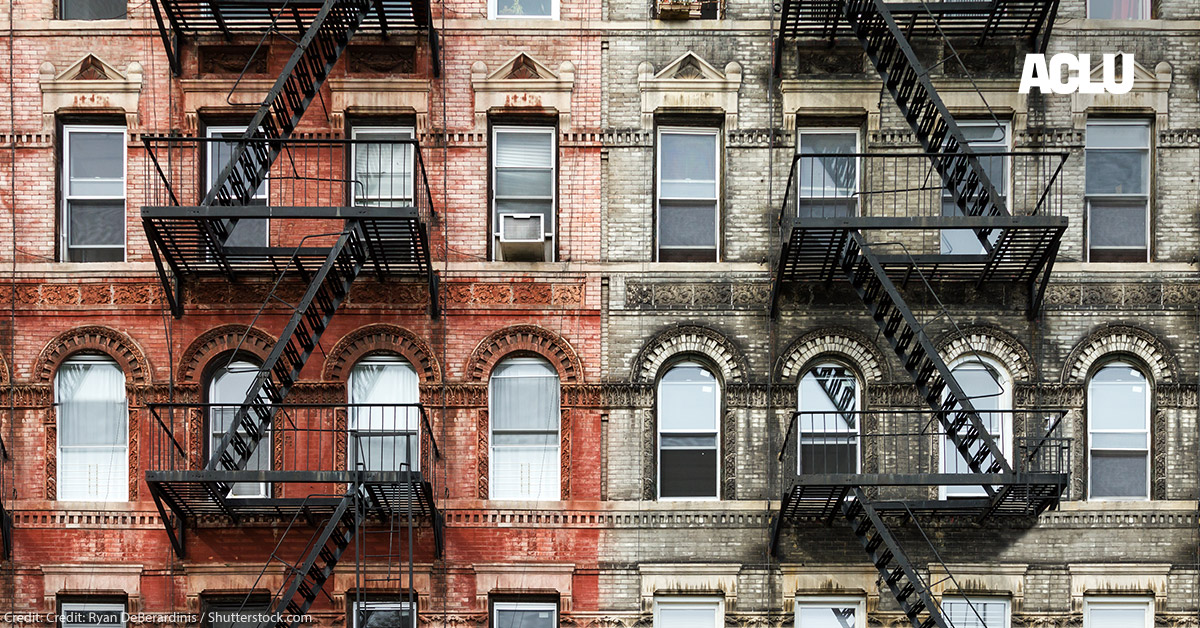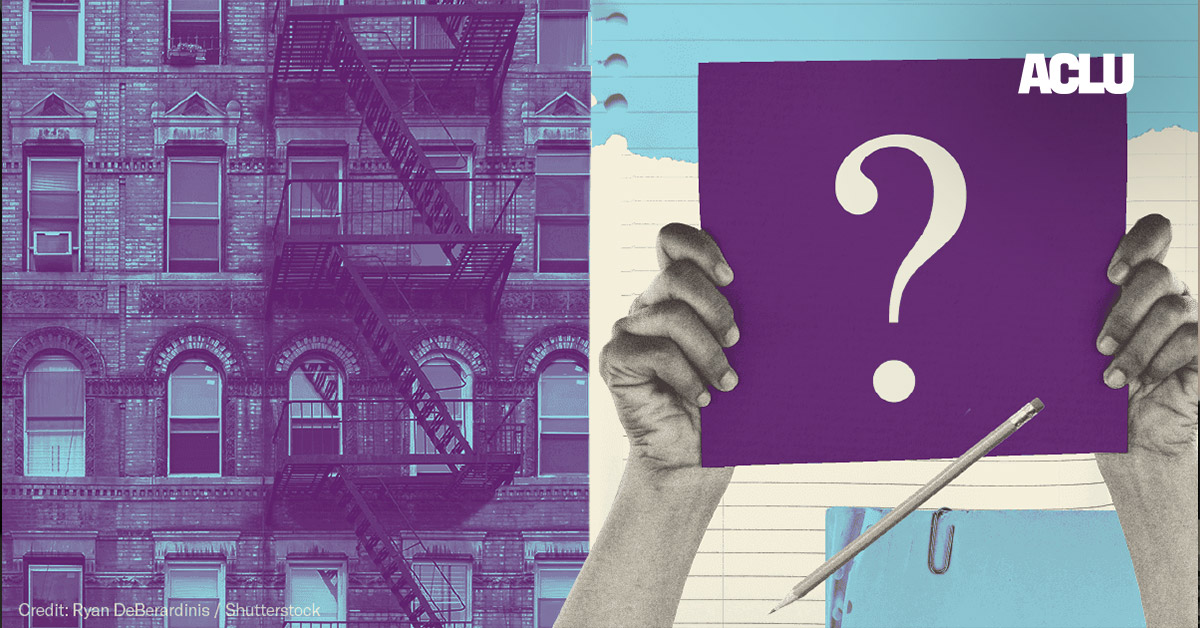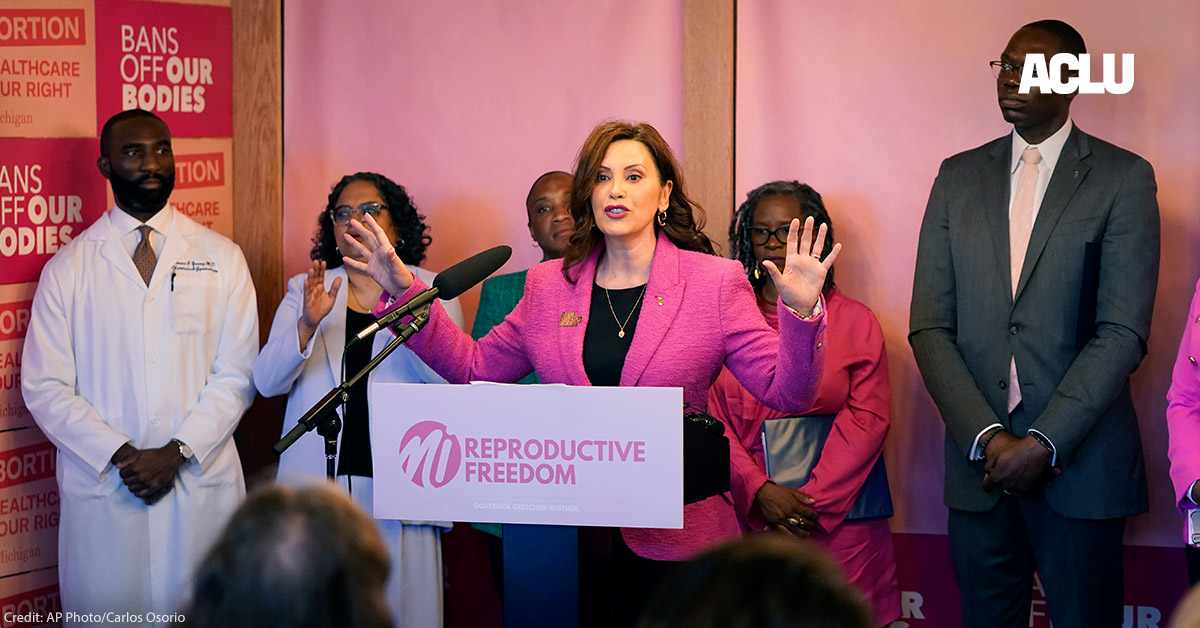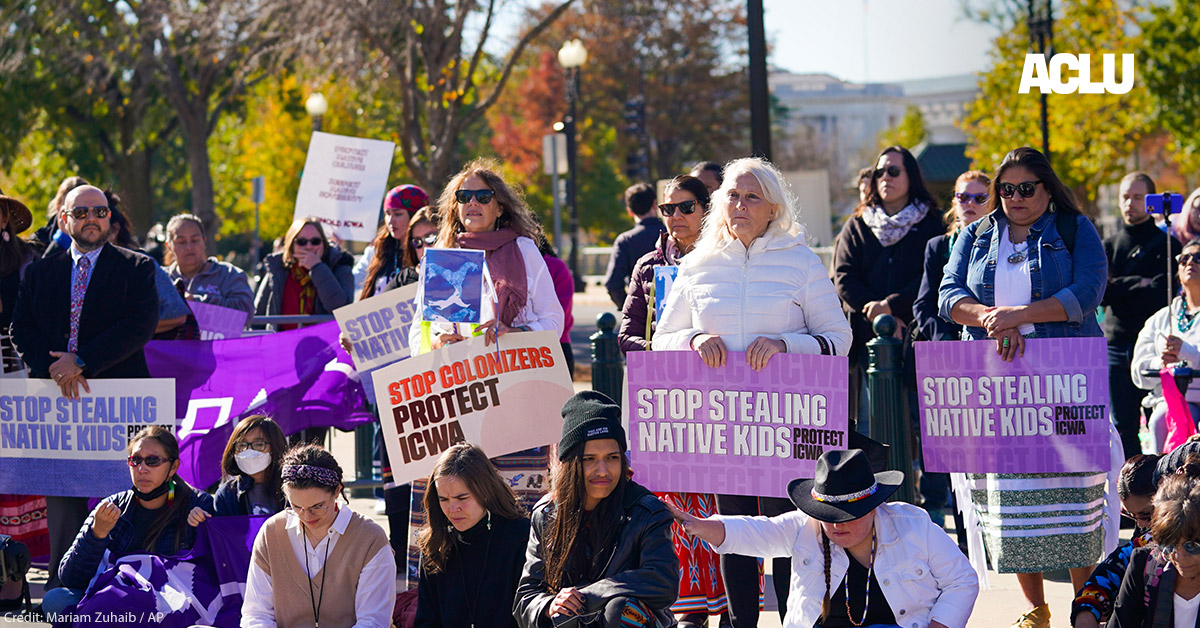Monday, 31 July 2023
Somalia: Poverty Reduction Strategy Paper-Joint Staff Advisory Note
Published July 31, 2023 at 07:00AM
Read more at imf.org
Brazil: 2023 Article IV Consultation-Press Release; Staff Report; Staff Supplement; and Statement by the Executive Director for Brazil
Published July 31, 2023 at 07:00AM
Read more at imf.org
ACLU: A Religious Public Charter School in Oklahoma? Not on Our Watch.
A religious school can’t be a public school, and a public school can’t be religious. These fundamental legal tenets have long protected both the integrity of our public-education system, which serves all students, and the right of private religious schools to indoctrinate students in accordance with a particular faith. In approving a Catholic public charter school, however, Oklahoma officials are not just blurring these lines separating church and state; they’re attempting to completely eviscerate them. We’re suing to put a stop to it.
Oklahoma’s public-school system includes both brick-and-mortar and virtual charter schools. State statutory provisions and the state constitution require these schools and all other public schools to remain open to all students — regardless of race, ethnicity, socioeconomic class, religion, LGBTQ status, disability, or any other characteristic — and to teach a non-religious curriculum. St. Isidore of Seville Catholic Virtual School will do neither. Nevertheless, in June, the Statewide Virtual Charter School Board, which authorizes and sponsors online charter schools, approved St. Isidore’s application, setting the school up to receive taxpayer funds and operate as a government entity.
In its application, St. Isidore asserts that it will be managed by the Archdiocese of Oklahoma City and will participate “in the evangelizing mission of the Church.” To that end, the school’s application makes clear that it will discriminate in admissions and student discipline, as necessary to satisfy the Catholic Church’s religious beliefs. This means that students could be denied admission or punished based on their religion, sexual orientation, gender identity, or other failures to comply with Catholic doctrine. St. Isidore even refused to certify that it will not discriminate against students with disabilities if accommodating a student would violate Catholic beliefs. The school also plans to discriminate in employment.
Not surprisingly, St. Isidore’s curriculum will be thoroughly religious, as “the School fully embraces the teachings of the Catholic Church” and will incorporate these teachings “into every aspect of the School,” including all subjects taught and all activities offered. The school aims to ensure all students know and believe that:
- “among all creatures, the human person is the only one created in God’s image with the ability to know and love God, and that God created persons male and female”;
- “because of sin humanity was separated from God, but in God’s love He has provided a path to salvation through the saving power of Christ, the second person of the Trinity, in His suffering, death and resurrection”; and
- “human persons are destined for eternal life with the Holy Trinity but that in freedom, an individual may reject God’s invitation and by this definitive self-exclusion end up in hell.”
A private religious school is, of course, well within its rights to teach these lessons. And churches are free to inculcate these beliefs in Sunday school. But they are wildly unconstitutional in public schools. Indeed, the mere notion of a religious public school is a constitutional oxymoron. This would be true for any proposed religious charter school — whether imposing Judaism, Islam, Buddhism, or any other faith on students. Government institutions cannot be religious entities, and that is what St. Isidore is. Even Oklahoma’s Republican attorney general has said that approving St. Isidore as a charter school is unlawful and has vowed to fight it.
Allowing St. Isidore to operate as planned would transform Oklahoma’s public schools into tools of discrimination and religious indoctrination. And, as the first religious public school in the nation, it could inspire copycats in other states, with grave consequences. It would threaten to severely undermine public education, a cornerstone of our democracy, while infringing the religious freedom of students, families, and taxpayers.
Our lawsuit, filed today in Oklahoma state court with Americans United for Separation of Church and State, the Education Law Center, and the Freedom From Religion Foundation, takes a stand against the insidious efforts to co-opt public schools for private, religious interests. We represent Oklahoma faith leaders, parents, and public-education advocates who have had enough. Public schools are not Sunday schools, and we and our allies will fight to keep it that way.
Published July 31, 2023 at 09:49PM
via ACLU https://ift.tt/NTQhbKo
ACLU: A Religious Public Charter School in Oklahoma? Not on Our Watch.
A religious school can’t be a public school, and a public school can’t be religious. These fundamental legal tenets have long protected both the integrity of our public-education system, which serves all students, and the right of private religious schools to indoctrinate students in accordance with a particular faith. In approving a Catholic public charter school, however, Oklahoma officials are not just blurring these lines separating church and state; they’re attempting to completely eviscerate them. We’re suing to put a stop to it.
Oklahoma’s public-school system includes both brick-and-mortar and virtual charter schools. State statutory provisions and the state constitution require these schools and all other public schools to remain open to all students — regardless of race, ethnicity, socioeconomic class, religion, LGBTQ status, disability, or any other characteristic — and to teach a non-religious curriculum. St. Isidore of Seville Catholic Virtual School will do neither. Nevertheless, in June, the Statewide Virtual Charter School Board, which authorizes and sponsors online charter schools, approved St. Isidore’s application, setting the school up to receive taxpayer funds and operate as a government entity.
In its application, St. Isidore asserts that it will be managed by the Archdiocese of Oklahoma City and will participate “in the evangelizing mission of the Church.” To that end, the school’s application makes clear that it will discriminate in admissions and student discipline, as necessary to satisfy the Catholic Church’s religious beliefs. This means that students could be denied admission or punished based on their religion, sexual orientation, gender identity, or other failures to comply with Catholic doctrine. St. Isidore even refused to certify that it will not discriminate against students with disabilities if accommodating a student would violate Catholic beliefs. The school also plans to discriminate in employment.
Not surprisingly, St. Isidore’s curriculum will be thoroughly religious, as “the School fully embraces the teachings of the Catholic Church” and will incorporate these teachings “into every aspect of the School,” including all subjects taught and all activities offered. The school aims to ensure all students know and believe that:
- “among all creatures, the human person is the only one created in God’s image with the ability to know and love God, and that God created persons male and female”;
- “because of sin humanity was separated from God, but in God’s love He has provided a path to salvation through the saving power of Christ, the second person of the Trinity, in His suffering, death and resurrection”; and
- “human persons are destined for eternal life with the Holy Trinity but that in freedom, an individual may reject God’s invitation and by this definitive self-exclusion end up in hell.”
A private religious school is, of course, well within its rights to teach these lessons. And churches are free to inculcate these beliefs in Sunday school. But they are wildly unconstitutional in public schools. Indeed, the mere notion of a religious public school is a constitutional oxymoron. This would be true for any proposed religious charter school — whether imposing Judaism, Islam, Buddhism, or any other faith on students. Government institutions cannot be religious entities, and that is what St. Isidore is.Even Oklahoma’s Republican attorney general has said that approving St. Isidore as a charter school is unlawful and has vowed to fight it.
Allowing St. Isidore to operate as planned would transform Oklahoma’s public schools into tools of discrimination and religious indoctrination. And, as the first religious public school in the nation, it could inspire copycats in other states, with grave consequences. It would threaten to severely undermine public education, a cornerstone of our democracy, while infringing the religious freedom of students, families, and taxpayers.
Our lawsuit, filed today in Oklahoma state court with Americans United for Separation of Church and State, the Education Law Center, and the Freedom From Religion Foundation, takes a stand against the insidious efforts to co-opt public schools for private, religious interests. We represent Oklahoma faith leaders, parents, and public-education advocates who have had enough. Public schools are not Sunday schools, and we and our allies will fight to keep it that way.
Published July 31, 2023 at 05:19PM
via ACLU https://ift.tt/6opKPZe
Friday, 28 July 2023
Iceland: Financial Sector Assessment Program-Technical Note on Stress Testing and Systemic Risk Analysis
Published July 28, 2023 at 07:00AM
Read more at imf.org
Republic of Estonia: 2023 Article IV Consultation-Press Release; and Staff Report
Published July 28, 2023 at 07:00AM
Read more at imf.org
Kingdom of the Netherlands-Curaçao and Sint Maarten: 2023 Article IV Consultation Discussions-Press Release; and Staff Report
Published July 28, 2023 at 07:00AM
Read more at imf.org
Thursday, 27 July 2023
Canada: 2023 Article IV Consultation-Press Release; and Staff Report
Published July 27, 2023 at 07:00AM
Read more at imf.org
Kingdom of the Netherlands—Aruba: 2023 Article IV Consultation Discussions-Press Release; and Staff Report
Published July 27, 2023 at 07:00AM
Read more at imf.org
Wednesday, 26 July 2023
Norway: 2023 Article IV Consultation-Press Release; and Staff Report
Published July 26, 2023 at 07:00AM
Read more at imf.org
Italy: 2023 Article IV Consultation-Press Release; Staff Report; and Statement by the Executive Director for Italy
Published July 26, 2023 at 07:00AM
Read more at imf.org
Tuesday, 25 July 2023
ACLU: When Will Biden Stop Giving Immigration Powers to Racist, Corrupt Sheriffs?
Earlier this month, a federal grand jury indicted Culpeper County, Virginia Sheriff Scott Jenkins for allegedly taking cash bribes and large campaign donations in exchange for appointing people “auxiliary deputy sheriffs” and allowing them to carry concealed firearms without a permit. Another sheriff, Chuck Jenkins (no relation) of Frederick County, Maryland, was also recently indicted for an alleged scheme that involved machine gun trafficking in exchange for political support in his re-election campaign.
These two sheriffs have more than just their names and reputed scandals in common: they both work with Immigration and Customs Enforcement (ICE).
Despite the criminal charges and a record of civil rights violations, the Biden administration has chosen to continue partnering with the two sheriffs through an immigration enforcement program known as 287(g), which permits state and local law enforcement agencies across the country to exercise federal authorities that are usually reserved to ICE agents.
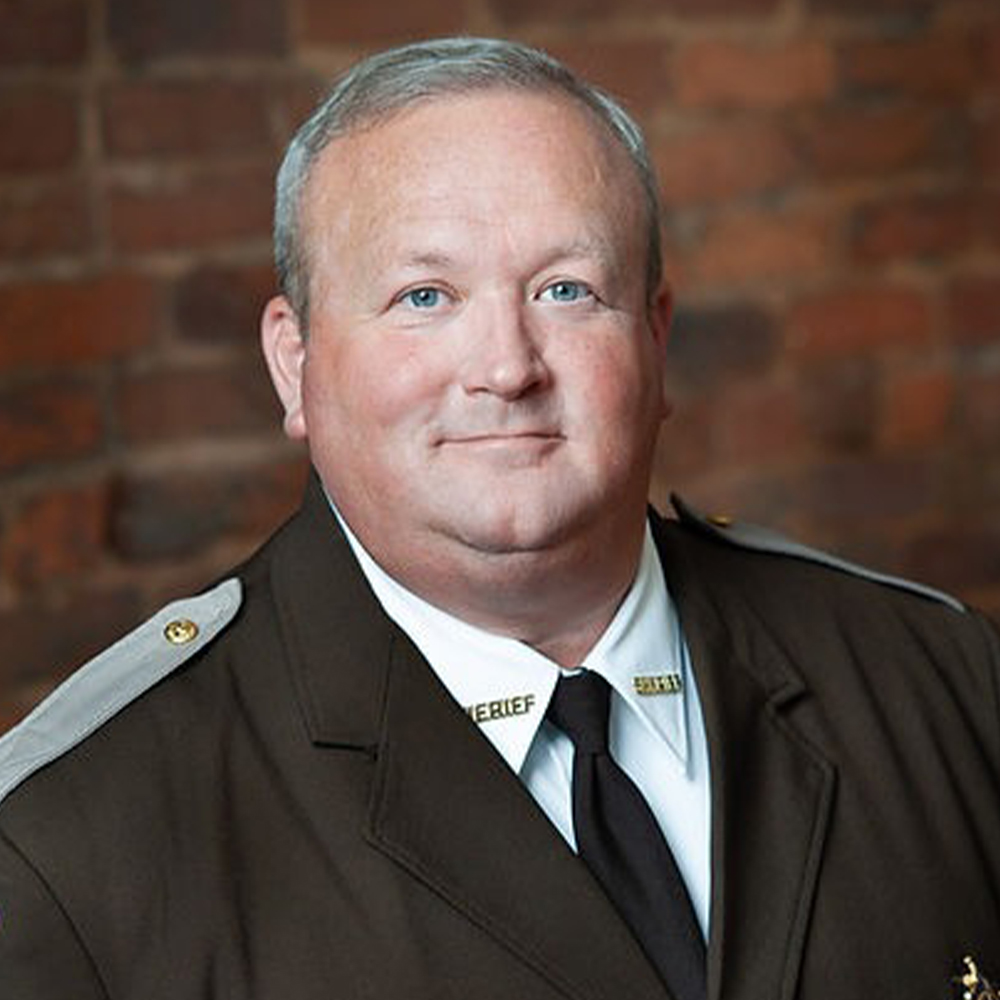
Sheriff Scott Jenkins
(Culpeper County Sheriff’s Office)
The program sounds technical, but its effect is devastatingly simple: Millions of our neighbors live in fear that if they interact with local law enforcement — even just seeking protection in urgent situations such as domestic violence — they’ll be turned over to ICE and deported from their families and the places they call home.
The two sheriffs are far from the only controversial law enforcement officials in the program. A 2022 ACLU report found that 65 percent of the Biden administration’s 287(g) partners have records of racial profiling and other civil rights violations, while 59 percent have records of pushing anti-immigrant hate.
Some of these sheriffs have expressed their anti-immigrant beliefs as a core part of their jobs. In an interview in which he touted the 287(g) program and appeared in uniform, Jenkins (of Maryland) described immigration to the U.S. as “chemical warfare against the United States,” because “the entire world hates this country, everybody around the world hates America, what we stand for, what we’re all about, the fabric of our society.” He bragged about creating a “virtual fence” around his county through immigration enforcement — falsely contending that neighboring counties without the program are “overwhelmed by illegals, a lot of criminals.”
The Biden administration can’t control local sheriffs — who are free to disagree with the Biden administration’s immigration policy and have the right to express their views.
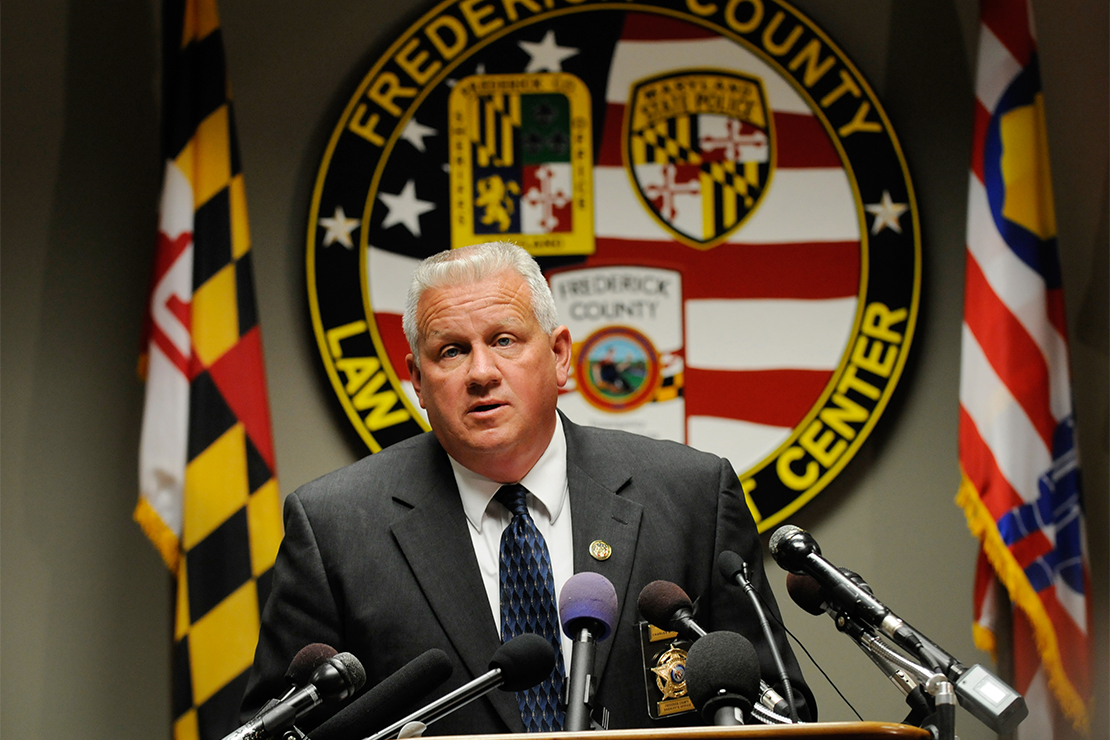
Sheriff Chuck Jenkins addressing the media.
ASSOCIATED PRESS
But the federal government can, and must, refuse to grant federal immigration powers to individuals who use their platform to stoke hatred and fear of immigrants.
And the federal government should not fund law enforcement by those who violate the civil rights of people in our communities.
We’ve seen again and again that sheriffs who make anti-immigrant statements have condoned or even encouraged illegal racial profiling in the policing of their communities. A glaring example is Alamance County, North Carolina Sheriff Terry Johnson, a current 287(g) participant with a long history of racist, anti-immigrant rhetoric. A damning Justice Department civil rights investigation found that the sheriff fostered a “culture of discrimination” that permeated the entire agency, and a pattern of discriminatory targeting of Latino people in arrests and detention. This prompted ICE to terminate the 287(g) partnership with the sheriff in 2012. But the Trump administration re-signed the sheriff onto the program — and the Biden administration has so far refused to terminate the agreement.
As a candidate, President Biden pledged to roll back 287(g) agreements initiated under Trump. More than two years into Biden’s term, the 287(g) program has only minorly shrunk from a peak of 152 partnerships under President Trump to 137 partnerships.
Meanwhile, numerous law enforcement leaders have spoken out against the program even while many face political and legal attempts to compel their participation. They include Mecklenburg County, North Carolina’s Sheriff Garry McFadden, who believes 287(g) undermines public safety and the prerogative of local voters. The state legislature in Florida has passed a law attempting to override local prerogatives and force sheriffs to apply to join the 287(g) program, while House Republicans in Congress have introduced legislation that would require ICE to approve any partnership application — no matter how abusive the sheriff.
Without a Senate-confirmed ICE director, the 287(g) program’s fate largely lies with Department of Homeland Security Secretary Alejandro Mayorkas. He continues to face down impeachment threats by the Republican-controlled House, which may be (wrongly) stalling the ICE reform agenda.
White House interests are at stake. President Biden issued important executive orders that led to a new policy to address racial profiling. But there’s a total mismatch between these White House efforts and its inaction on the 287(g) program, which is a notorious vehicle for racial profiling.
The consequences for our neighbors and loved ones are stark. “I’ve actually had clients who have told me that they didn’t go to the hospital when they had their first child because they were really worried,” said local attorney Adriel Orozco, who co-wrote our complaint on 287(g) partner Alamance County.
It’s long past time for the Biden administration to stop empowering racist sheriffs — and do more to support civil rights and protections in our communities.
Published July 25, 2023 at 09:59PM
via ACLU https://ift.tt/mK2dEsM
ACLU: When Will Biden Stop Giving Immigration Powers to Racist, Corrupt Sheriffs?
Earlier this month, a federal grand jury indicted Culpeper County, Virginia Sheriff Scott Jenkins for allegedly taking cash bribes and large campaign donations in exchange for appointing people “auxiliary deputy sheriffs” and allowing them to carry concealed firearms without a permit. Another sheriff, Chuck Jenkins (no relation) of Frederick County, Maryland, was also recently indicted for an alleged scheme that involved machine gun trafficking in exchange for political support in his re-election campaign.
These two sheriffs have more than just their names and reputed scandals in common: they both work with Immigration and Customs Enforcement (ICE).
Despite the criminal charges and a record of civil rights violations, the Biden administration has chosen to continue partnering with the two sheriffs through an immigration enforcement program known as 287(g), which permits state and local law enforcement agencies across the country to exercise federal authorities that are usually reserved to ICE agents.

Sheriff Scott Jenkins
(Culpeper County Sheriff’s Office)
The program sounds technical, but its effect is devastatingly simple: Millions of our neighbors live in fear that if they interact with local law enforcement — even just seeking protection in urgent situations such as domestic violence — they’ll be turned over to ICE and deported from their families and the places they call home.
The two sheriffs are far from the only controversial law enforcement officials in the program. A 2022 ACLU report found that 65 percent of the Biden administration’s 287(g) partners have records of racial profiling and other civil rights violations, while 59 percent have records of pushing anti-immigrant hate.
Some of these sheriffs have expressed their anti-immigrant beliefs as a core part of their jobs. In an interview in which he touted the 287(g) program and appeared in uniform, Jenkins (of Maryland) described immigration to the U.S. as “chemical warfare against the United States,” because “the entire world hates this country, everybody around the world hates America, what we stand for, what we’re all about, the fabric of our society.” He bragged about creating a “virtual fence” around his county through immigration enforcement — falsely contending that neighboring counties without the program are “overwhelmed by illegals, a lot of criminals.”
The Biden administration can’t control local sheriffs — who are free to disagree with the Biden administration’s immigration policy and have the right to express their views.

Sheriff Chuck Jenkins addressing the media.
ASSOCIATED PRESS
But the federal government can, and must, refuse to grant federal immigration powers to individuals who use their platform to stoke hatred and fear of immigrants.
And the federal government should not fund law enforcement by those who violate the civil rights of people in our communities.
We’ve seen again and again that sheriffs who make anti-immigrant statements have condoned or even encouraged illegal racial profiling in the policing of their communities. A glaring example is Alamance County, North Carolina Sheriff Terry Johnson, a current 287(g) participant with a long history of racist, anti-immigrant rhetoric. A damning Justice Department civil rights investigation found that the sheriff fostered a “culture of discrimination” that permeated the entire agency, and a pattern of discriminatory targeting of Latino people in arrests and detention. This prompted ICE to terminate the 287(g) partnership with the sheriff in 2012. But the Trump administration re-signed the sheriff onto the program — and the Biden administration has so far refused to terminate the agreement.
As a candidate, President Biden pledged to roll back 287(g) agreements initiated under Trump. More than two years into Biden’s term, the 287(g) program has only minorly shrunk from a peak of 152 partnerships under President Trump to 137 partnerships.
Meanwhile, numerous law enforcement leaders have spoken out against the program even while many face political and legal attempts to compel their participation. They include Mecklenburg County, North Carolina’s Sheriff Garry McFadden, who believes 287(g) undermines public safety and the prerogative of local voters. The state legislature in Florida has passed a law attempting to override local prerogatives and force sheriffs to apply to join the 287(g) program, while House Republicans in Congress have introduced legislation that would require ICE to approve any partnership application — no matter how abusive the sheriff.
Without a Senate-confirmed ICE director, the 287(g) program’s fate largely lies with Department of Homeland Security Secretary Alejandro Mayorkas. He continues to face down impeachment threats by the Republican-controlled House, which may be (wrongly) stalling the ICE reform agenda.
White House interests are at stake. President Biden issued important executive orders that led to a new policy to address racial profiling. But there’s a total mismatch between these White House efforts and its inaction on the 287(g) program, which is a notorious vehicle for racial profiling.
The consequences for our neighbors and loved ones are stark. “I’ve actually had clients who have told me that they didn’t go to the hospital when they had their first child because they were really worried,” said local attorney Adriel Orozco, who co-wrote our complaint on 287(g) partner Alamance County.
It’s long past time for the Biden administration to stop empowering racist sheriffs — and do more to support civil rights and protections in our communities.
Published July 25, 2023 at 05:29PM
via ACLU https://ift.tt/pZvz3m8
Burundi: Request for a 38-Month Arrangement under the Extended Credit Facility-Press Release; Staff Report; and Statement by the Executive Director for Burundi
Published July 25, 2023 at 07:00AM
Read more at imf.org
ACLU: How Eviction Brands Renters With a Scarlet Letter
While many might assume that racial housing segregation is a thing of the past, predatory practices by landlords keep it alive in communities across the country.
Landlords commonly use “no-evictions” policies that unfairly shut out families from housing for years. These policies broadly exclude applicants with an “eviction” — without distinguishing between eviction filings and judgments or considering individual circumstances. Instead, these policies automatically reject all applicants from housing if they have any connection to an eviction case, even if, for example, the eviction case was dismissed or very old, or the family is now financially stable.
Since our inception in 1968, HOPE Fair Housing (HOPE) has dedicated itself to eliminating housing discrimination in Illinois by standing at the forefront to challenge policies and practices that create barriers to housing choice for residents throughout Cook County and beyond. Blanket bans on people with arrest and conviction records, selective enforcement of crime-free and nuisance-free ordinances, and source of income discrimination all continue to impact Black households in Cook County and across the United States.
Now, we are taking on “no-evictions” policies as a significant barrier to fair housing for all families. With the help of the ACLU, the ACLU of Illinois, and the National Housing Law Project, we filed a civil rights complaint with the U.S. Department of Housing and Urban Development (HUD) against one of the largest operators of rental housing in Oak Park, Illinois. We argue that Oak Park Apartments’ “No-Evictions” policy both discriminates against Black renters and Black women renters and perpetuates and reinforces residential segregation.
According to an expert analysis, between September 2010 to March 2023, Black people were approximately 56% of those either served with an eviction case or evicted by the Sheriff’s Office in Cook County though they make up only 33% of all renters. Black women alone accounted for approximately 33% of those who experienced an eviction case despite making up just 22% of all renters. A housing provider that enforces a policy that denies the opportunity to rent to anyone who has an eviction filing or judgment is disproportionately denying housing to Black households and Black women in particular. With evictions in Cook County at the highest rate they have been in years, “No-Evictions” policies will continue to block families from new housing opportunities.
There is no justification for automatically rejecting all housing applicants because they had some connection to an eviction case. While housing providers can choose to complete tenant screenings, applying discriminatory criteria — such as those used by Oak Park Apartments — violates fair housing law. We can no longer ignore the consequences of these policies and the communities they harm.
Oak Park Apartments’ “no-evictions” policy is even more alarming because it perpetuates segregation in Oak Park. For more than 50 years, the village of Oak Park has made deliberate efforts to build and maintain a racially integrated community. Blanket tenant screening policies that deny applicants with “any eviction” the opportunity to rent an apartment are a threat to these efforts and contribute to racial segregation in Cook County.
All communities, and especially those dedicated to promoting integration such as Oak Park, deserve better than landlord policies that deny Black women the human right to housing opportunities. The residents of Oak Park should demand swift policy changes now from any housing provider that may be employing a “no evictions” blanket ban policy.
The U.S. Department of Housing and Urban Development Secretary Marcia L. Fudge has called on the fair housing movement to take action to correct the systems and barriers that are causing harm to our communities. We have responded, and trust that HUD will use its investigative and enforcement authority to eliminate these harmful policies in Oak Park, Cook County, and across the country.
Published July 25, 2023 at 08:27PM
via ACLU https://ift.tt/X5THBKZ
ACLU: How Eviction Brands Renters With a Scarlet Letter
While many might assume that racial housing segregation is a thing of the past, predatory practices by landlords keep it alive in communities across the country.
Landlords commonly use “no-evictions” policies that unfairly shut out families from housing for years. These policies broadly exclude applicants with an “eviction” — without distinguishing between eviction filings and judgments or considering individual circumstances. Instead, these policies automatically reject all applicants from housing if they have any connection to an eviction case, even if, for example, the eviction case was dismissed or very old, or the family is now financially stable.
Since our inception in 1968, HOPE Fair Housing (HOPE) has dedicated itself to eliminating housing discrimination in Illinois by standing at the forefront to challenge policies and practices that create barriers to housing choice for residents throughout Cook County and beyond. Blanket bans on people with arrest and conviction records, selective enforcement of crime-free and nuisance-free ordinances, and source of income discrimination all continue to impact Black households in Cook County and across the United States.
Now, we are taking on “no-evictions” policies as a significant barrier to fair housing for all families. With the help of the ACLU, the ACLU of Illinois, and the National Housing Law Project, we filed a civil rights complaint with the U.S. Department of Housing and Urban Development (HUD) against one of the largest operators of rental housing in Oak Park, Illinois. We argue that Oak Park Apartments’ “No-Evictions” policy both discriminates against Black renters and Black women renters and perpetuates and reinforces residential segregation.
According to an expert analysis, between September 2010 to March 2023, Black people were approximately 56% of those either served with an eviction case or evicted by the Sheriff’s Office in Cook County though they make up only 33% of all renters. Black women alone accounted for approximately 33% of those who experienced an eviction case despite making up just 22% of all renters. A housing provider that enforces a policy that denies the opportunity to rent to anyone who has an eviction filing or judgment is disproportionately denying housing to Black households and Black women in particular. With evictions in Cook County at the highest rate they have been in years, “No-Evictions” policies will continue to block families from new housing opportunities.
There is no justification for automatically rejecting all housing applicants because they had some connection to an eviction case. While housing providers can choose to complete tenant screenings, applying discriminatory criteria — such as those used by Oak Park Apartments — violates fair housing law. We can no longer ignore the consequences of these policies and the communities they harm.
Oak Park Apartments’ “no-evictions” policy is even more alarming because it perpetuates segregation in Oak Park. For more than 50 years, the village of Oak Park has made deliberate efforts to build and maintain a racially integrated community. Blanket tenant screening policies that deny applicants with “any eviction” the opportunity to rent an apartment are a threat to these efforts and contribute to racial segregation in Cook County.
All communities, and especially those dedicated to promoting integration such as Oak Park, deserve better than landlord policies that deny Black women the human right to housing opportunities. The residents of Oak Park should demand swift policy changes now from any housing provider that may be employing a “no evictions” blanket ban policy.
The U.S. Department of Housing and Urban Development Secretary Marcia L. Fudge has called on the fair housing movement to take action to correct the systems and barriers that are causing harm to our communities. We have responded, and trust that HUD will use its investigative and enforcement authority to eliminate these harmful policies in Oak Park, Cook County, and across the country.
Published July 25, 2023 at 03:57PM
via ACLU https://ift.tt/kXFMtmH
Monday, 24 July 2023
Republic of Congo: Republic of Congo: Third Review under the Three-year Arrangement under the Extended Credit Facility, Requests for Modification and Waivers of Nonobservance of Performance Criteria, and Financing Assurances Review-Press Release; Staff Report; and Statement by the Executive Director for the Republic of Congo
Published July 24, 2023 at 07:00AM
Read more at imf.org
Friday, 21 July 2023
ACLU: The Illinois Supreme Court Cash Bail Ruling, Explained
Under a landmark court ruling issued this week, Illinois will become the first state in the nation to abolish cash bail. The state supreme court upheld the Illinois Pretrial Fairness Act, which abolishes cash bail and specifies procedures judges must use to impose pretrial detention. Here’s what you need to know, and what happens next.
What does the Illinois Pretrial Fairness Act do?
In addition to eliminating cash bail, the Illinois Pretrial Fairness Act clarifies that everyone is eligible for pretrial release, and it’s the government’s burden to prove that anyone should be detained.
Why was there a lawsuit over it?
Despite broad support for this law, including support from victims’ rights advocates, the law was challenged by officials from a small county. Three of their claims made it to the Illinois Supreme Court: that abolishing cash bail violates the right to bail, the rights of crime victims, and separation of powers under Illinois law.
What did the court decide?
The Illinois Supreme Court rejected all these arguments. Specifically, the court held:
- “Bail” doesn’t require money. There are plenty of ways for courts to ensure that people return to court, and keep everyone safe, without ordering a person to pay for their freedom.
- Abolishing cash bail doesn’t harm victims. Under the new law, judges must consider safety risks posed by release, and give victims notice of relevant bail proceedings.
- Abolishing cash bail is squarely within the legislature’s power. Separation of powers means that it’s up to judges to apply the law in individual cases. But changing the legal framework — here, eliminating cash bail — is perfectly appropriate for the legislature to do.
This landmark ruling refutes false narratives about cash bail. The truth is that abolishing cash bail improves public safety by allowing people to return to their communities and families who would otherwise be in jail only because they can’t pay for their freedom. When people can go home, take care of their families, and keep up with school or work, that stability makes all our communities safer and stronger.
What happens next?
The law goes into effect on September 18. Anyone currently jailed under a cash bail order will get a release hearing under the new law, and Illinois becomes the first state to implement a pretrial system that will never demand payment for release.
Other states should follow this example by passing laws that abolish cash bail and reduce pretrial detention. Increasing reliance on cash bail over the last three decades has contributed to a significant rise in pretrial detention, which in turn contributes to our status as the leading incarcerator in the world. None of this has made communities safer, but it has subjected countless people to the dangers of being locked in jail cells, and deprived them of equal justice. We can reverse this trend by releasing more people pretrial, which jurisdictions across the country are doing with great success. These examples show that safety and freedom go hand in hand.
Published July 22, 2023 at 12:10AM
via ACLU https://ift.tt/AlU1Lqb
ACLU: The Illinois Supreme Court Cash Bail Ruling, Explained
Under a landmark court ruling issued this week, Illinois will become the first state in the nation to abolish cash bail. The state supreme court upheld the Illinois Pretrial Fairness Act, which abolishes cash bail and specifies procedures judges must use to impose pretrial detention. Here’s what you need to know, and what happens next.
What does the Illinois Pretrial Fairness Act do?
In addition to eliminating cash bail, the Illinois Pretrial Fairness Act clarifies that everyone is eligible for pretrial release, and it’s the government’s burden to prove that anyone should be detained.
Why was there a lawsuit over it?
Despite broad support for this law, including support from victims’ rights advocates, the law was challenged by officials from a small county. Three of their claims made it to the Illinois Supreme Court: that abolishing cash bail violates the right to bail, the rights of crime victims, and separation of powers under Illinois law.
What did the court decide?
The Illinois Supreme Court rejected all these arguments. Specifically, the court held:
- “Bail” doesn’t require money. There are plenty of ways for courts to ensure that people return to court, and keep everyone safe, without ordering a person to pay for their freedom.
- Abolishing cash bail doesn’t harm victims. Under the new law, judges must consider safety risks posed by release, and give victims notice of relevant bail proceedings.
- Abolishing cash bail is squarely within the legislature’s power. Separation of powers means that it’s up to judges to apply the law in individual cases. But changing the legal framework — here, eliminating cash bail — is perfectly appropriate for the legislature to do.
This landmark ruling refutes false narratives about cash bail. The truth is that abolishing cash bail improves public safety by allowing people to return to their communities and families who would otherwise be in jail only because they can’t pay for their freedom. When people can go home, take care of their families, and keep up with school or work, that stability makes all our communities safer and stronger.
What happens next?
The law goes into effect on September 18. Anyone currently jailed under a cash bail order will get a release hearing under the new law, and Illinois becomes the first state to implement a pretrial system that will never demand payment for release.
Other states should follow this example by passing laws that abolish cash bail and reduce pretrial detention. Increasing reliance on cash bail over the last three decades has contributed to a significant rise in pretrial detention, which in turn contributes to our status as the leading incarcerator in the world. None of this has made communities safer, but it has subjected countless people to the dangers of being locked in jail cells, and deprived them of equal justice. We can reverse this trend by releasing more people pretrial, which jurisdictions across the country are doing with great success. These examples show that safety and freedom go hand in hand.
Published July 21, 2023 at 07:40PM
via ACLU https://ift.tt/Mef1mLI
Tuvalu: 2023 Article IV Consultation-Press Release; Staff Report; and Statement by the Executive Director for Tuvalu
Published July 21, 2023 at 07:00AM
Read more at imf.org
Thursday, 20 July 2023
Wednesday, 19 July 2023
Kenya: Fifth Reviews Under the Extended Fund Facility and Extended Credit Facility Arrangements and Request for a 20-Month Arrangement Under the Resilience and Sustainability Facility, Requests for Extension, Rephasing, and Augmentation of Access, Modification of a Performance Criterion, Waiver of Applicability for Performance Criteria and Waiver of Nonobservance for a Performance Criterion, and Monetary Policy Consultation Clause-Press Release; Staff Report; and Statement by the Executive Director for Kenya
Published July 19, 2023 at 07:00AM
Read more at imf.org
Grenada: 2023 Article IV Consultation-Press Release; and Staff Report
Published July 19, 2023 at 07:00AM
Read more at imf.org
Euro Area Policies: 2023 Article IV Consultation-Press Release; Staff Report; and Statement by the Executive Director for Euro Area; IMF Country Report No. 23/264
Published July 19, 2023 at 11:00AM
Read more at imf.org
Tuesday, 18 July 2023
South Africa: Technical Assistance Report—Monetary and Financial Statistics (Duty Station-based) Mission (August 10–23, 2022); IMF Country Report No. 23/263
Published July 18, 2023 at 07:00AM
Read more at imf.org
Cabo Verde: 2023 Article IV Consultation, Second Review Under the Extended Credit Facility Arrangement, and Request for Modification of a Performance Criterion-Press Release; Staff Report; and Statement by the Executive Director for Cabo Verde
Published July 18, 2023 at 07:00AM
Read more at imf.org
Pakistan: Request for a Stand-by Arrangement-Press Release; Staff Report; Staff Statement; and Statement by the Executive Director for Pakistan
Published July 18, 2023 at 07:00AM
Read more at imf.org
Monday, 17 July 2023
Friday, 14 July 2023
ACLU: How Michiganders Showed Up for Reproductive Freedom and Won
Last year’s decision overturning Roe v. Wade proved to be a major galvanizing moment for people who support abortion rights in communities across the country as bans began to go into effect. One of those states is Michigan, where a grassroots coalition had growing concerns about an archaic 1931 abortion ban that could take effect if the Supreme Court overturned Roe v. Wade, and had already been working to prepare for that possibility. Their tireless work put abortion rights on the ballot with Proposal 3, which secured the right to reproductive freedom in Michigan, protecting abortion, prenatal care, birth control, and all pregnancy-related care.

Here, two of the advocates who led the Proposal 3 charge with community partners discuss how they showed up to protect reproductive freedom for Michiganders.
These interviews have been edited and condensed for clarity.
Bonsitu Kitaba-Gaviglio
Deputy Legal Director, ACLU of Michigan

“In 2019, an unprecedented number of state legislatures passed laws across the country banning abortion, including at very early stages in pregnancy. That effort led to a circuit split, and just two years later, the U.S. Supreme Court took up a case from Mississippi called Dobbs v. Jackson Women’s Health Organization. Dobbs squarely put in front of the court once again the question of whether abortion was a constitutional right and at what stage of pregnancy it should be protected. By taking that case, the Supreme Court sent a clear message to the country that they were ready to reexamine the Roe v. Wade decision, which had protected the right to abortion for nearly 50 years.
“We knew we could not sit idly by and needed to do something in Michigan to defend the longstanding right to bodily autonomy. After a series of discussions with various stakeholders and impacted people, it was clear that the most enduring way to protect the full spectrum of reproductive rights was to initiate and pass a state constitutional amendment.
“A ballot initiative is, at its core, direct democracy. It’s voters and the people of Michigan coming together to say we believe in this issue, we believe in passing this law or this constitutional amendment, and we’re going to collect the signatures to put this on the ballot so voters, not politicians, get to decide. And so the idea for Proposal 3 — a constitutional amendment that would enshrine the right to reproductive freedom in our state constitution — really came from the people. We couldn’t rely on the Supreme Court anymore, so we as the people of Michigan had to take that fight into our own hands.
We couldn’t rely on the Supreme Court anymore, so we as the people of Michigan had to take that fight into our own hands.
“ACLU of Michigan, Michigan Voices, and Planned Parenthood Advocates of Michigan were three of the organizations leading a diverse coalition of groups and individuals in the fight to secure reproductive freedom in our state through Proposal 3. We needed to achieve justice together with Black and Brown communities and women in particular who have been historically denied access to full reproductive rights. The language of Proposal 3 is expansive and protective; it not only protects your right to seek an abortion, but it protects your right to make all decisions related to pregnancy, including contraception, prenatal care, childbirth, miscarriage care, and infertility. It also prohibits the government from passing laws to make it harder for you to get an abortion or to exercise your right to any other form of reproductive health care.
“We launched the campaign in January 2022 and quickly began collecting signatures on the ballot initiative. But frankly, we were having a hard time because not many people realized that the Supreme Court was poised to overturn Roe until the leak of the draft opinion happened.
“I remember the moment the Dobbs draft decision was leaked as a moment of sheer disbelief. I remember getting on a call with my colleagues at the ACLU of Michigan asking each other, ‘Is this real? Can we really believe what we’re seeing?’ Reading the words in that opinion were gut wrenching because it was stripping our choice, stripping our futures. In that moment, we had to strategize and think quickly about what to do next, even though we were in shock.
“The leak galvanized so many people in Michigan and across the country because I think it made them scared that this court could really overturn Roe, 50 years worth of constitutional protections, and that it did not believe in their right to bodily autonomy. When the leak happened, many Michiganders quickly understood that Michigan was not a safe haven for reproductive rights, and that fired people up and it fired me up to continue our work. That was a pivotal point in the campaign where people came out of the woodwork to help — people were collecting signatures, talking to their families and communities about what reproductive freedom meant to them, how they could volunteer, and why they should vote for Proposal 3.
“During the campaign and on election night, all eyes were on Michigan. There were a couple other ballot initiatives being run at the same time, but really Michigan was the test to see if we could win on abortion in the Midwest, in a purple state.
“And it was a resounding success! We collected more signatures than any other ballot initiative in our state’s history. On election night it was surreal to see the results of Proposal 3 passing. It was a fantastic feeling — years of hard work finally actualized. Michiganders sent a message back to the Supreme Court and country that abortion rights can win. Michigan is a safe haven now for reproductive rights and reproductive freedom.
“I hope the energy of what we did here in Michigan will spread across the country. We set the course, and hopefully created a blueprint for other states to do the same.”
Sommer Foster and Shanay Watson-Whittaker
Michigan Voices
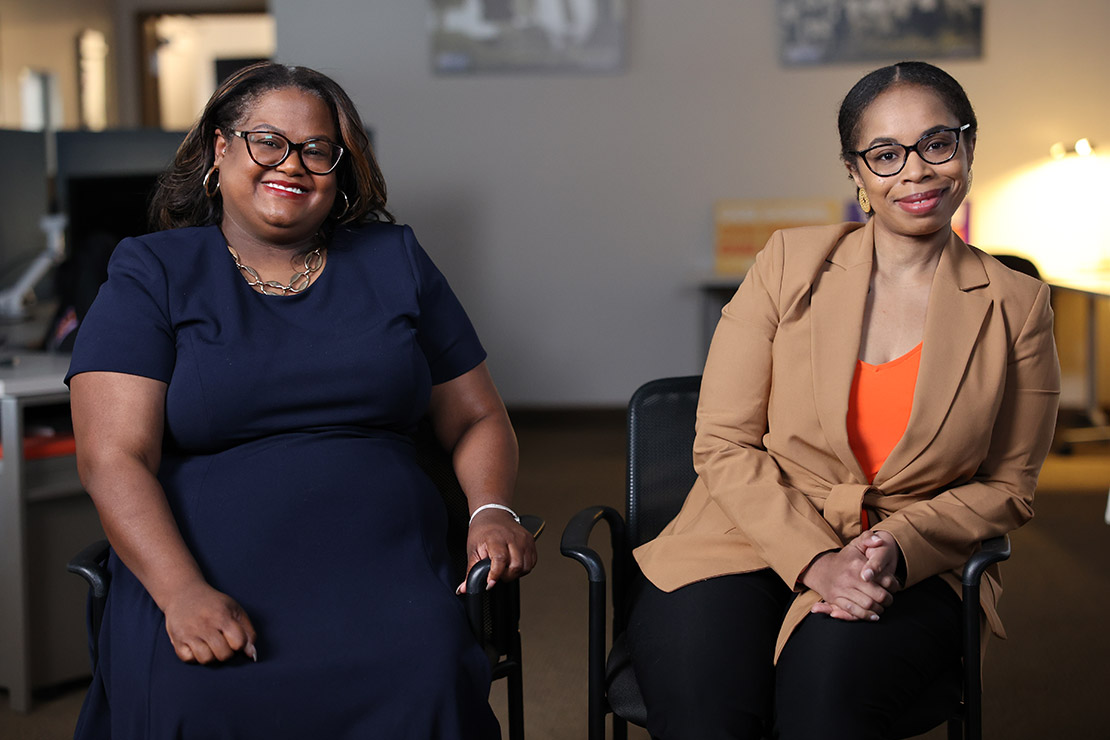
“We had an inkling that Roe v. Wade could be overturned for a long time. It was part of the reason that we formed the Reproductive Justice Work Group.
“The language in Proposal 3 was developed by our partners who made it really clear they didn’t want something that just talked about abortion because that wasn’t enough for them and for their communities. We wanted to center our work around reproductive justice. Reproductive rights has been around for a very long time, but BIPOC people have felt disconnected from that movement. For us, it goes beyond the right to have an abortion, and so Proposal 3 is the most inclusive law that we have to protect reproductive freedom. It protects the right to contraception, the right to infertility treatment, the right to miscarriage management, the right to be treated with dignity [during childbirth], and the right to have an abortion.
“We are really proud of that law. We’re proud that we got it on the ballot and that the voters passed it.
“Roe being overturned was shocking to us for the campaign. It let people know that we were really in danger of losing our rights and that people had to get involved and engaged in this campaign in order to save reproductive rights and abortion access in Michigan.
“So it got real and personal for people and they got involved. We had folks out on the street, at farmer’s markets, in community meetings getting signatures. Folks went to talk to their neighbors, their family members, and they told their own personal abortion stories or why it was important to them. We were at grocery stores, churches, and barbecues. We were out there. Wherever you could find us, we were there. We went door to door. About 753,000 people signed the petition for Proposal 3 and it was history making. Michigan never had that many folks sign a petition to get something on the ballot. This is about lives and people and the right to make decisions about their own bodies. And this ballot initiative was about putting the decision in the hands of voters of Michigan. And they once again proved us right, that they want reproductive care and they want reproductive freedom.
This is about lives and people and the right to make decisions about their own bodies. And this ballot initiative was about putting the decision in the hands of voters of Michigan.
“When the numbers came in on election night, it was just a huge sigh of relief. I cried. Victory was wonderful. It was just a wonderful night. In Michigan, we’ve shown that our voters really care about their reproductive rights and that we have the most comprehensive and the most inclusive law to protect those rights in the state of Michigan
“Michiganders saved ourselves. We didn’t wait for politicians to save us. We didn’t wait for an elected official to save us. We decided to take this chance and take this opportunity. And we did this. We did this as a coalition. The ACLU of Michigan, as well as Planned Parenthood, Advocates of Michigan, and Michigan Voices moving forward together. And we’re still moving forward together. We have a lot of work to do, and I look forward to working together more in the future.”
Published July 14, 2023 at 09:18PM
via ACLU https://ift.tt/FNfUwS4
ACLU: How Michiganders Showed Up for Reproductive Freedom and Won
Last year’s decision overturning Roe v. Wade proved to be a major galvanizing moment for people who support abortion rights in communities across the country as bans began to go into effect. One of those states is Michigan, where a grassroots coalition had growing concerns about an archaic 1931 abortion ban that could take effect if the Supreme Court overturned Roe v. Wade, and had already been working to prepare for that possibility. Their tireless work put abortion rights on the ballot with Proposal 3, which secured the right to reproductive freedom in Michigan, protecting abortion, prenatal care, birth control, and all pregnancy-related care.

Here, two of the advocates who led the Proposal 3 charge with community partners discuss how they showed up to protect reproductive freedom for Michiganders.
These interviews have been edited and condensed for clarity.
Bonsitu Kitaba-Gaviglio
Deputy Legal Director, ACLU of Michigan

“In 2019, an unprecedented number of state legislatures passed laws across the country banning abortion, including at very early stages in pregnancy. That effort led to a circuit split, and just two years later, the U.S. Supreme Court took up a case from Mississippi called Dobbs v. Jackson Women’s Health Organization. Dobbs squarely put in front of the court once again the question of whether abortion was a constitutional right and at what stage of pregnancy it should be protected. By taking that case, the Supreme Court sent a clear message to the country that they were ready to reexamine the Roe v. Wade decision, which had protected the right to abortion for nearly 50 years.
“We knew we could not sit idly by and needed to do something in Michigan to defend the longstanding right to bodily autonomy. After a series of discussions with various stakeholders and impacted people, it was clear that the most enduring way to protect the full spectrum of reproductive rights was to initiate and pass a state constitutional amendment.
“A ballot initiative is, at its core, direct democracy. It’s voters and the people of Michigan coming together to say we believe in this issue, we believe in passing this law or this constitutional amendment, and we’re going to collect the signatures to put this on the ballot so voters, not politicians, get to decide. And so the idea for Proposal 3 — a constitutional amendment that would enshrine the right to reproductive freedom in our state constitution — really came from the people. We couldn’t rely on the Supreme Court anymore, so we as the people of Michigan had to take that fight into our own hands.
We couldn’t rely on the Supreme Court anymore, so we as the people of Michigan had to take that fight into our own hands.
“ACLU of Michigan, Michigan Voices, and Planned Parenthood Advocates of Michigan were three of the organizations leading a diverse coalition of groups and individuals in the fight to secure reproductive freedom in our state through Proposal 3. We needed to achieve justice together with Black and Brown communities and women in particular who have been historically denied access to full reproductive rights. The language of Proposal 3 is expansive and protective; it not only protects your right to seek an abortion, but it protects your right to make all decisions related to pregnancy, including contraception, prenatal care, childbirth, miscarriage care, and infertility. It also prohibits the government from passing laws to make it harder for you to get an abortion or to exercise your right to any other form of reproductive health care.
“We launched the campaign in January 2022 and quickly began collecting signatures on the ballot initiative. But frankly, we were having a hard time because not many people realized that the Supreme Court was poised to overturn Roe until the leak of the draft opinion happened.
“I remember the moment the Dobbs draft decision was leaked as a moment of sheer disbelief. I remember getting on a call with my colleagues at the ACLU of Michigan asking each other, ‘Is this real? Can we really believe what we’re seeing?’ Reading the words in that opinion were gut wrenching because it was stripping our choice, stripping our futures. In that moment, we had to strategize and think quickly about what to do next, even though we were in shock.
“The leak galvanized so many people in Michigan and across the country because I think it made them scared that this court could really overturn Roe, 50 years worth of constitutional protections, and that it did not believe in their right to bodily autonomy. When the leak happened, many Michiganders quickly understood that Michigan was not a safe haven for reproductive rights, and that fired people up and it fired me up to continue our work. That was a pivotal point in the campaign where people came out of the woodwork to help — people were collecting signatures, talking to their families and communities about what reproductive freedom meant to them, how they could volunteer, and why they should vote for Proposal 3.
“During the campaign and on election night, all eyes were on Michigan. There were a couple other ballot initiatives being run at the same time, but really Michigan was the test to see if we could win on abortion in the Midwest, in a purple state.
“And it was a resounding success! We collected more signatures than any other ballot initiative in our state’s history. On election night it was surreal to see the results of Proposal 3 passing. It was a fantastic feeling — years of hard work finally actualized. Michiganders sent a message back to the Supreme Court and country that abortion rights can win. Michigan is a safe haven now for reproductive rights and reproductive freedom.
“I hope the energy of what we did here in Michigan will spread across the country. We set the course, and hopefully created a blueprint for other states to do the same.”
Sommer Foster and Shanay Watson-Whittaker
Michigan Voices

“We had an inkling that Roe v. Wade could be overturned for a long time. It was part of the reason that we formed the Reproductive Justice Work Group.
“The language in Proposal 3 was developed by our partners who made it really clear they didn’t want something that just talked about abortion because that wasn’t enough for them and for their communities. We wanted to center our work around reproductive justice. Reproductive rights has been around for a very long time, but BIPOC people have felt disconnected from that movement. For us, it goes beyond the right to have an abortion, and so Proposal 3 is the most inclusive law that we have to protect reproductive freedom. It protects the right to contraception, the right to infertility treatment, the right to miscarriage management, the right to be treated with dignity [during childbirth], and the right to have an abortion.
“We are really proud of that law. We’re proud that we got it on the ballot and that the voters passed it.
“Roe being overturned was shocking to us for the campaign. It let people know that we were really in danger of losing our rights and that people had to get involved and engaged in this campaign in order to save reproductive rights and abortion access in Michigan.
“So it got real and personal for people and they got involved. We had folks out on the street, at farmer’s markets, in community meetings getting signatures. Folks went to talk to their neighbors, their family members, and they told their own personal abortion stories or why it was important to them. We were at grocery stores, churches, and barbecues. We were out there. Wherever you could find us, we were there. We went door to door. About 753,000 people signed the petition for Proposal 3 and it was history making. Michigan never had that many folks sign a petition to get something on the ballot. This is about lives and people and the right to make decisions about their own bodies. And this ballot initiative was about putting the decision in the hands of voters of Michigan. And they once again proved us right, that they want reproductive care and they want reproductive freedom.
This is about lives and people and the right to make decisions about their own bodies. And this ballot initiative was about putting the decision in the hands of voters of Michigan.
“When the numbers came in on election night, it was just a huge sigh of relief. I cried. Victory was wonderful. It was just a wonderful night. In Michigan, we’ve shown that our voters really care about their reproductive rights and that we have the most comprehensive and the most inclusive law to protect those rights in the state of Michigan
“Michiganders saved ourselves. We didn’t wait for politicians to save us. We didn’t wait for an elected official to save us. We decided to take this chance and take this opportunity. And we did this. We did this as a coalition. The ACLU of Michigan, as well as Planned Parenthood, Advocates of Michigan, and Michigan Voices moving forward together. And we’re still moving forward together. We have a lot of work to do, and I look forward to working together more in the future.”
Published July 14, 2023 at 04:48PM
via ACLU https://ift.tt/GaHBv9q
Thursday, 13 July 2023
Zambia: 2023 Article IV Consultation, First Review Under the Extended Credit Facility Arrangement, and Financing Assurances Review-Press Release; Staff Report; and Statement by the Executive Director for Zambia
Published July 13, 2023 at 07:00AM
Read more at imf.org
Republic of Mozambique: Second Review Under the Three-Year Arrangement Under the Extended Credit Facility, Requests for Modification of The Monetary Policy Consultation Clause, Waivers of Nonobservance for Quantitative Performance Criteria, and Financing Assurances Review-Press Release; Staff Report; and Statement by the Executive Director for the Republic of Mozambique
Published July 13, 2023 at 07:00AM
Read more at imf.org
Wednesday, 12 July 2023
Niger: Third Review Under the Extended Credit Facility Arrangement, Request for Extension, Rephasing, and Modification of Performance Criteria of the Extended Credit Facility Arrangement, and Request for an Arrangement Under the Resilience and Sustainability Facility-Press Release; Staff Report; and Statement by the Executive Director for Niger
Published July 12, 2023 at 07:00AM
Read more at imf.org
Tuesday, 11 July 2023
ACLU: Looking Beyond Haaland v. Brackeen
Last month, the Supreme Court issued a decision in Haaland v. Brackeen, delivering a landmark victory for tribal sovereignty, Native children, Native families, and the future of Native people. In a 7-2 decision by Justice Amy Coney Barrett, the Court rejected all of the constitutional challenges to the Indian Child Welfare Act (ICWA) — some on the merits and others for lack of standing.
The ACLU submitted an amicus brief in the case, and has been following the issue closely because of the profound threat it poses to Indigenous communities, particularly federally recognized tribes in the United States. In light of this victory at the Supreme Court, we are now urging states to take action and introduce or strengthen existing state-level ICWA protections.
Understanding the Indian Child Welfare Act
ICWA was passed in 1978 to establish basic requirements to protect Native American children from removal from their homes and communities. These protections are essential given centuries-long attempts to destroy Native peoples through genocide and massacres, forced assimilation, and legalized kidnapping during the boarding school era. Native people are also deeply overrepresented within the family regulation system, where unfamiliar cultural practices and poverty were (and are) consistently misused to tear apart Indigenous families and communities and place Native children with white, Christian families.
Before ICWA, approximately one third of Native American/Alaska Native children were taken from their homes by state welfare agencies and private adoption agencies, and a shocking 85 percent of those children were placed outside of family or community care with non-Native people. ICWA sought to change these devastating policies and practices by creating heightened procedural protections when Native children face removal, and creating preferences for foster or adoptive placement with extended family, the child’s tribe, or another tribe.
Unpacking the Supreme Court’s Decision
In Brackeen, non-Native couples and the state of Texas attacked ICWA on four grounds: congressional power, the anticommandeering doctrine, equal protection, and nondelegation. On the first two grounds, the victory was decisive. The court reaffirmed that “Congress’s power to legislate with respect to Indians is well-established and broad.” While the court cautioned that the power of Congress is not unlimited, its positive references to precedent regarding criminal law, domestic violence, employment, property, tax, and trade make major upheavals on this issue in the future unlikely.
The court’s anticommandeering analysis was equally decisive. In a nutshell, the anticommandeering doctrine says that the federal government can’t require states to adopt federal law or use state resources, funds, or personnel to enforce federal law. Leveraging this argument, ICWA’s opponents argued the law violated the 10th Amendment — a misreading of the doctrine that could’ve upended the longstanding balance between federal and state law and the rights of Native people to be free from discrimination and governmental abuse. But the court’s decision makes clear that ICWA applies to both state and private actors, and, where the law does require state courts to apply federal law, well, that is just how preemption works. On these issues, the decision sends a clear message to ICWA opponents that these attacks on the federal government’s ability to shape state law and policy on matters of tribal sovereignty have no legal foundation.
The court did not entertain the incredibly far-reaching equal protection arguments urged by plaintiffs or the nondelegation doctrine, finding that none of the plaintiffs had standing. The plaintiffs sought an injunction against federal officials, but it is state officers who apply ICWA, in state court proceedings. The court reasoned that a decision on equal protection would not rectify the plaintiffs’ asserted injury — that non-Native parents are on unequal footing with Native parents given ICWA’s placement preferences. And Texas doesn’t have equal protection rights to advance.
Looking to the States
We hope this decision will lay to rest the attacks on tribal sovereignty. However, the ACLU will continue to monitor the corporate-backed powers that pushed this case to the high court for any sign of further attacks on ICWA, along with other laws impacting federal y-recognized tribes.
Now that the Supreme Court has reaffirmed ICWA’s validity, states must act swiftly to pass their own state ICWA laws to strengthen the implementation of the federal law. As outlined below, several states have already passed such laws. The ACLU urges states that have not yet done so to act now. ICWA creates a floor of strong protections, but states are free to build on this foundation and further support tribal child welfare systems. And where the Supreme Court has identified limitations on what federal ICWA requires — for example, in the context of searching for placements that satisfy ICWA’s preferences — states can and should require more. States are also well poised to work with Tribal nations to craft their own ICWA laws that cater to specific issues that might arise in their jurisdiction.
As states develop this legislation, lawmakers should codify protections that go beyond the federal legislation — as many states have already done. For example, Washington State’s ICWA law states that when Native children are removed from the home, preference must go first to extended family, whether Indian or non-Indian, then to tribal and other Indian homes near the child’s home. While we encourage state legislatures to look to other states that have adopted their own ICWA laws, we recognize that each state is unique — especially in regard to the varying characteristics and needs of its Native American constituents. States must engage with leaders from Tribal nations at each step of the way.
For states that already have ICWA legislation on the books, we again encourage lawmakers to engage in meaningful consultation with their Native American constituents and leaders from Tribal nations in their state. Lawmakers should ask whether current state ICWA laws are meeting the needs of their communities, and if there are areas for improvement, we urge them to act quickly to protect Native families.
Published July 11, 2023 at 11:09PM
via ACLU https://ift.tt/xRvN2a1

